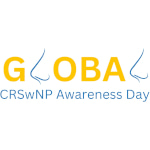Global CRSwNP Awareness Day Date in the current year: April 24, 2026
 Global CRSwNP Awareness Day, also known as Global Chronic Rhinosinusitis with Nasal Polyps Awareness Day or Global Nasal Polyp Syndrome Awareness Day, is observed annually on April 24 to educate patients and healthcare providers about a widely underestimated debilitating condition.
Global CRSwNP Awareness Day, also known as Global Chronic Rhinosinusitis with Nasal Polyps Awareness Day or Global Nasal Polyp Syndrome Awareness Day, is observed annually on April 24 to educate patients and healthcare providers about a widely underestimated debilitating condition.Sinusitis, also known as rhinosinusitis, is an inflammation of the mucous membranes lining the sinuses (four air-filled spaces surrounding the nasal cavity) that causes symptoms such as nasal congestion, production of thick mucus, partial or complete loss of smell, and facial pain or headache. Some patients may also experience fever, tooth or ear pain, sore throat, and/or halitosis (bad breath). Rhinosunusitis is considered chronic if it lasts longer than 12 weeks.
There are two main types of chronic rhinosinusitis: chronic rhinosinusitis without nasal polyps (CRSsNP) and chronic rhinosinusitis with nasal polyps (CRSwNP, also known as nasal polyp syndrome). The latter involves the development of soft, painless and benign growths in the paranasal sinuses and eventually in the nasal passages.
The exact causes of chronic rhinosinusitis are unknown. Possible causes or triggers include respiratory infections, allergic reactions, immune system disorders, pollutants in the air, smoking (including secondhand smoke) and genetic factors. It is also unclear why some people with CRS develop polyps and others don’t.
Many people underestimate chronic sinusitis thinking that a stuffy or runny nose is not a big deal. But dealing with these symptoms for weeks or even months can have a significant impact on patients’ ability to perform daily tasks and overall quality of life, so it is very important to educate the general public about the conditions and encourage people living with CRSwNP to seek treatment.
The first line of treatment for CRSwNP is corticosteroids to reduce inflammation. They can be used topically (as a nasal spray or drops) or taken orally. Oral steroids provide dramatic relief but are not suitable for long-term use due to their side effects, whereas nasal steroids can be used long-term. Steroids may be combined with nasal saline rinses to relieve congestion.
Other treatment options include endoscopic sinus surgery to remove polyps and biologics such as dupilumab, mepolizumab and omalizumab (which are expensive and not available in all countries). Antibiotics may be prescribed if there is a concurrent bacterial infection but they are not otherwise needed. Antihistamines may relieve symptoms but do not treat the underlying disease.
Global CRSwNP Awareness Day was launched in 2022 by EUFOREA (European Forum for Research and Education in Allergy and Airway Diseases), a non-profit organization that brings together national and international agencies, institutions and organizations dedicated to preventing and reducing the burden of allergies and airway diseases such as asthma, rhinitis and rhinosinusitis. The primary goal of Global CRSwNP Awareness Day is to raise awareness of nasal polyp syndrome and advocate for improved access to care and resources for patients living with the disease.
- Category
- International Observances
- Tags
- Global CRSwNP Awareness Day, international observances, awareness days, rhinosinusitis with nasal polyps, nasal polyp syndrome